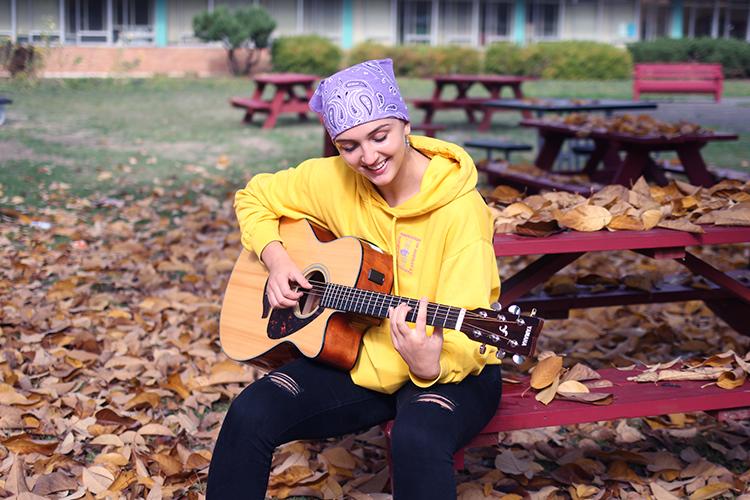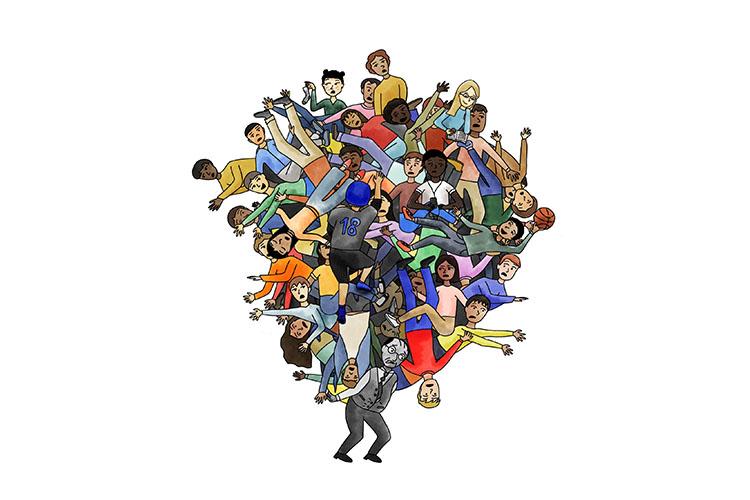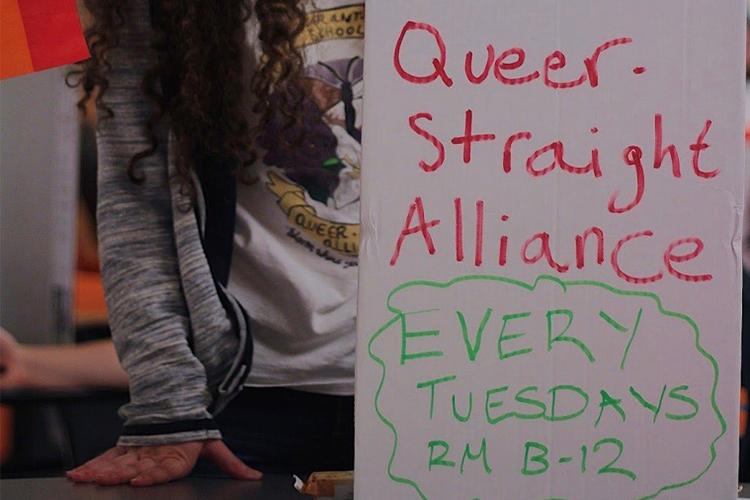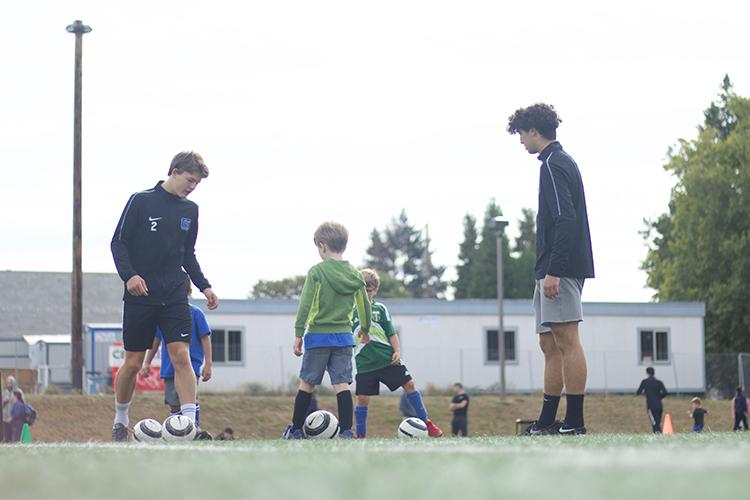
Senior Marin Leonard twists the tuning pegs on her guitar with a shaky left hand before looking out on the audience at the spring 2018 Grant Dance Showcase. The soft buzz of voices in the crowd in front of her fades and Leonard feels her heartbeat in her ears. She adjusts the mic and plays Jessica Murray’s words of encouragement over in her head in an effort to distract herself from the haze of stage fright clouding her mind.
Her gaze shifts to the enthusiastic faces of a small group of her basketball teammates and a narrow smile spreads across Leonard’s face. “I could tell she really loves it,” says Leonard’s close friend and teammate, Amaya Aldridge.
Then, her eyes lock with her father and the nerves are joined by a tightness in her chest, reminding her of their troubled history. Leonard’s thoughts drift to a fond childhood memory of watching in awe as her dad skillfully switched from chord to chord on his guitar. But this positive memory is met with uncertainty and hurt from the times he has let her down. “All these things were running through my head because I hadn’t seen him in years and I wasn’t actually sure if he was going to show up,” she says.
As the lights in the Marshall auditorium dim, there is a faint shuffle from her fellow dancers as they take their places on stage behind her. She begins to play. The words of Ella Mai’s song “Naked” effortlessly leave Leonard’s lips and her guitar hums a slow, heartfelt melody. But this piece means more to Leonard than some might think.
Its lyrics speak to the importance of loving someone for every part of who they are and what their true identity is. This is something that Leonard has struggled with throughout her experiences with the drastically different worlds of music and basketball.
The Spring Showcase was the first time that Leonard was able to overcome her stage fright and perform her music publicly for an audience larger than a few friends or family members since middle school.
Leonard is known for being a standout player on the basketball court by her peers, starting on the varsity team as a freshman.
But not many people know how important music is to her. “I’d never really seen her do that stuff in person before … It was the first time I saw her demonstrate all that she can do,” says Aldridge.
After her dad left because of his relapse in alcoholism, Leonard turned to guitar and songwriting. She spent hours in her room writing music and even filled an entire notebook with songs about her father. “It was my way to deal with a lot of the stuff that I was going through because of my relationship with my dad,” Leonard says.
But the more personal content about her father leaving made sharing difficult. “Writing and music became a really vulnerable and private part of me,” she says, “I was always really nervous and uncomfortable about sharing it.”
From the age of 13 until last spring when she performed at the showcase, Leonard had not publicly shared her musical talents with anyone. This hiatus from performing, the transition of her musical content and an identity shift towards basketball meant that Leonard began to experience extreme stage fright that in some cases compromised her ability to play and sing. “I don’t know if it was a fear of being judged but … it was really bad,” she says. “I would be shaking and my voice would crack.”
But after her performance at the Dance Showcase, Leonard’s peers began to see her in a different light. “I’ve always felt the need to check myself in a box of athlete and basketball player or musician and artist and I had never found the happy medium between both,” she says. For Leonard, knowing that people accept her for both aspects of her personality is meaningful.

Leonard was born on October 18, 2000 to parents Andrea and Scott Leonard. Despite having a split family ever since she was born, Leonard maintained a close relationship with her dad and spent every other week living with him.
She has been singing since she could talk and picked up her first instrument around the age of seven. “I had a little keyboard and I started writing songs,” Leonard says of her earliest musical endeavors. “I think I still have some of them actually, in my old pink notebook.”
When she was 8 years old, her father taught her to play guitar. Leonard says that this was an important bonding moment for the two of them. “Growing up when I would be at my dad’s house I would just sit there and watch him play guitar,” she says. “I was just so fascinated by it.”
Throughout her childhood, Leonard’s mother remarried three times and went through a series of boyfriends. It was hard for Leonard to build stable relationships with these father figures, knowing that at any moment they could walk out of her life. “I would get attached really easily as a kid, which has kind of been my weakness just like trusting people and … loving people too easily,” she says. “(It) was hard for me growing up and having all of these different men come into my life and then leave.”
Her father had also remarried after Leonard was born. However, her new stepmother was a recovering alcoholic as well. Her father had reached 20 years of sobriety when his relationship with his wife began to go downhill, causing them both to relapse. “It started with both of them being out during the night and then me being at my mom’s more often,” Leonard says. She now realizes that her father created this distance between them because he did not want her to see him returning to alcoholism. “As young as I was … I still didn’t understand everything that was going on,” she says.
When Leonard’s mother, Andrea Leonard, found a new husband and moved from West Linn to Portland to live with him, the distance between Leonard and her father was too much for her to handle.
After her father stopped being an active part of her life, Leonard began to struggle with her confidence. “As a kid I was always really confused about why he left or why he wasn’t there,” she says. “I think I just assumed it was me.”
She found herself trapped in her head, not knowing how to make sense of the hole her dad had left in her life. Leonard used songwriting to deal with the abandonment issues that she developed from this emotional confusion and frustration. “I would write about that and about him and how I felt about it so it was just a lot of personal stuff which I always kept kind of secret and private from everyone else. I didn’t even share it with my mom,” she says.
Leonard would spend hours in her music room, which she had decorated with string lights and artwork, writing songs and playing her guitar. “A lot of the time I try to hold back my emotions but I feel like I can be emotional and feel whatever I want to feel here just because it is my space.”
When her music became too personal to share, Leonard looked to basketball as a way to handle her pent-up emotions. “Basketball had kind of turned into my identity so the people around me saw me as ‘Marin the basketball player,’” she says.
This persona was purposeful for Leonard. “I wanted them to see basketball because that is what I had kind of created for myself,” she says. “Music is so personal to me and basketball isn’t necessarily so it was a way for me to cope, I think, that was more accepted or just easier to do emotionally than music.”
Leonard used basketball as protection against the vulnerability that came with her music. “I have always wanted people to see the musical side of me – I just haven’t gotten to the point where I had the courage or confidence to do that,” she says.
Despite her lack of confidence off the court, she continued to excel in basketball. After training with an experienced coach and a group of older boys throughout middle school, she made the varsity team at Grant as a freshman. This solidified her identity as a basketball player.
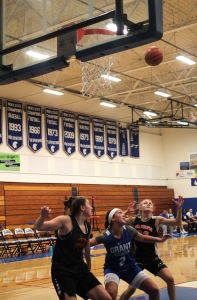
Once she hit high school, Leonard stopped playing music all together.
But in the spring of her junior year, Leonard injured her back in cross training class. The students were working on a series of exercises in the weight room. As Leonard went up in weight and the time limit went down she felt increasing pressure to fit in as many deadlifts as she could. “I didn’t have the right form so my back was arched,” she says. Leonard describes a series of five pops as she lifted the bar on her last rep. “I knew right away that I had hurt my back and it was really bad,” she says.
The recovery time for her injury forced her to sit out for the entirety of the spring basketball season. Leonard was devastated.
For the first time, she was able to prioritize her artistic side. And when her dance teacher, Jessica Murray, suggested that she perform in the Spring Showcase, Leonard had an opportunity to show her talents.
“I have always wanted people to see the musical side of me – I just haven’t gotten to the point where I had the courage or confidence to do that.” -Marin Leonard
Despite Murray’s support, Leonard did not want to perform in front of a large audience. The idea of putting her emotions on the line frightened Leonard. “Having to build up my confidence with performance was something that was and still is really personal to me,” she says. This was amplified by the fact that her father was still absent from her life and music had been their personal connection. “I wasn’t really confident with my music which had always been a huge part of my life but she kept pushing me until I decided that I would sing in the showcase,” Leonard says regarding Murray’s efforts.
Murray knew how talented Leonard was at playing guitar. She says that in order to help Leonard be brave enough to get over her stage fright and perform in front of an audience of strangers, she helped Leonard identify the small steps that she could take to build up her confidence. “These artistic passions are important,” says Murray. “And when she is comfortable she has a beautiful voice and she really plays well.”
With the support and encouragement from Murray, Leonard had the confidence to perform for the first time since her music became solely personal.
A few weeks before the dance showcase, Leonard made the decision to send her father the information for the show. “He was the reason why I had gotten into music and performing and he had been at a lot of my other performances as a kid,” she says.
In preparation for her performance, Leonard tried to clear some of her nerves by performing for smaller groups and the feedback she got from these groups was overwhelmingly positive. “Knowing that I had all that support … helps and it feels good so just knowing that everyone is being really supportive even if I were to mess up,” she says.
The lyricism in the song that she chose preached about what it means to truly love and accept someone for everything that they are, hence the title “Naked.” “I have had huge struggles with identity so the meaning of the song is … try not to care or think too much about what others think and also just to love yourself,” she says. Being able to overcome this fear of vulnerability and have the courage to perform for her father was a pivotal moment in Leonard’s life.
Before going onstage, Leonard reminded herself of the faith that Murray had in her ability. “Around the time of the showcase she was saying how proud she was of me for being able to share my musical side,” Leonard recalls. “She would say, ‘You are going to do great, just don’t worry about it, we are going to get you over this fear.’” She describes being nervous as she made her way to her spot on stage but as she saw her teammates smiling up at her from the crowd, Leonard was reminded of what she had worked through to make it there.
She also remembers the conflicting feelings that she had upon seeing her father in the audience. Leonard was surprised that he had made the two hour trip from Tillamook to Portland, but seeing him reminded her of the pain that he had caused her by leaving in the first place. “I was shocked at first but I really appreciated it because he definitely didn’t have to come especially after not having talked for a while,” she says. “It just showed me that he made an effort which is really important to me.”
The night of the showcase initiated a regeneration of the relationship between Leonard and her father. “In that moment … I just felt full of love and forgiveness,” she says. Although she will not forget her rocky past with her father, Leonard says she is beginning to forgive him for leaving his family.
Leonard says that a big part of the reason why her father was absent for so long was because he didn’t want her to see him struggling with alcoholism. But she knows that his decision to come back into her life means that he has been making progress. “I know he had started going to (Alcoholics Anonymous) meetings,” she says.
For Leonard, the showcase was an opportunity to begin to forgive her father and reopen their communication through music which had always been their way of connecting. And her father took that opportunity by showing up for two nights of her performance. “Since then, I have been seeing him and our relationship is growing again,” says Leonard.
After seeing the positive response from people in her life that performing prompted and how music was able to rekindle her relationship with her father, Leonard has decided to invest herself into the arts once again. She has since let go of her previous goal of playing Division I basketball in college. “A lot of my perspectives changed and then I got back into the arts and kind of forgot how much I loved doing music,” she says.
Leonard is now considering a wider range of schools that can offer her both an opportunity to play basketball and continue progressing in music. “I also reached out to this art school in San Francisco and they have Division II basketball there so that would kind of be the best of both worlds,” she says. Currently, she is taking advanced guitar, audio engineering and the advanced dance performance class at Grant. “I just wanna kind of get better at all the stuff that I never worked on while I was so focused on basketball.”
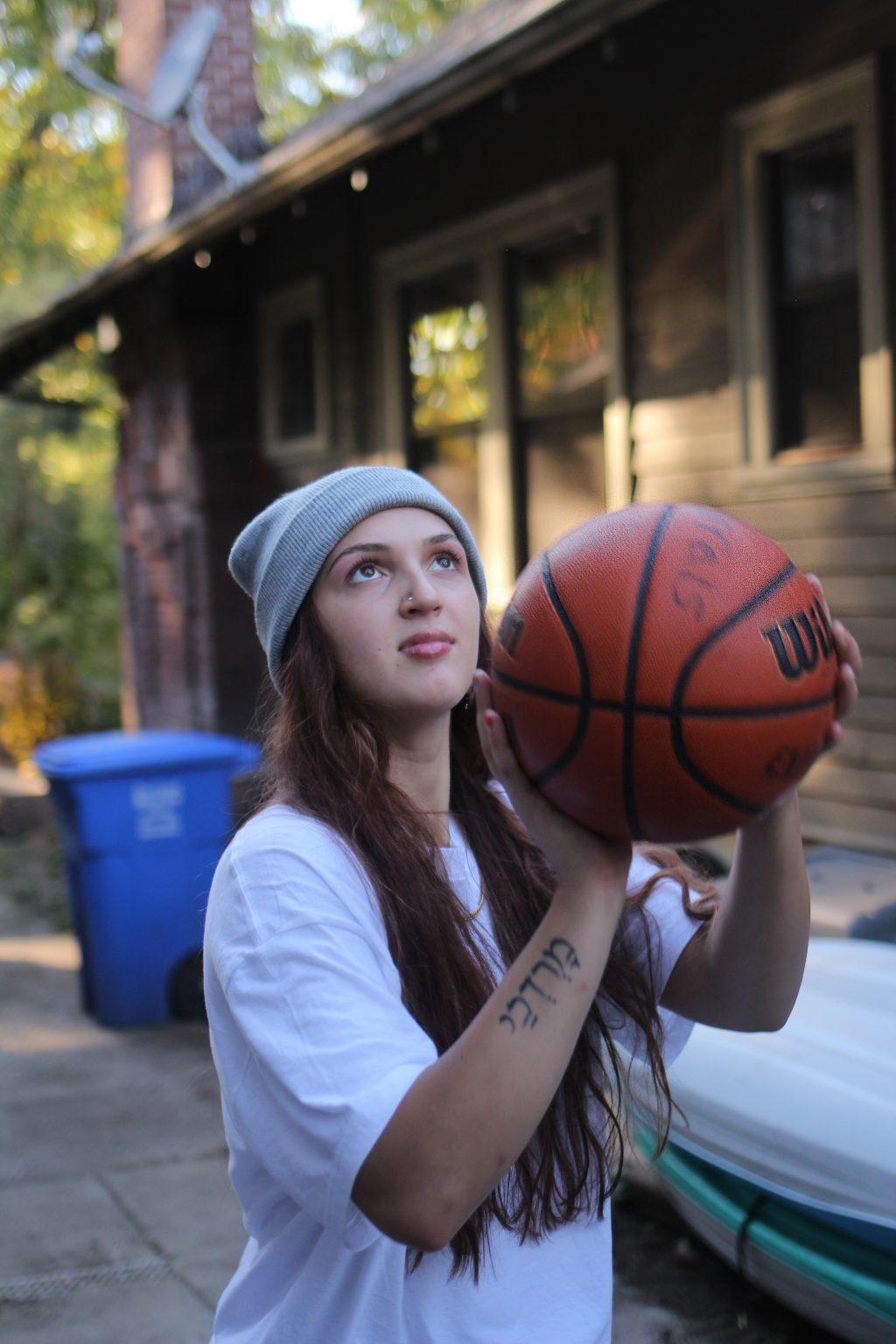
Looking forward, Leonard hopes to build on her performing ability and technical skill. “I have always just kind of taught myself. I taught myself how to play guitar, I taught myself how to play piano, but if you were to ask me what chords I was playing I probably wouldn’t be able to tell you.”
After her father’s second night watching her perform, they had dinner together and caught up on what he has missed after seven years of not seeing his daughter. “He said that I have improved a lot and grown into myself,” Leonard says of their interaction. “I think me reaching out to him rather than vice versa kind of gave him hope or made it easier for him to try and be a dad again.”



























